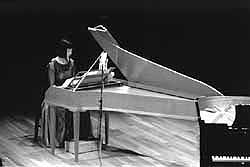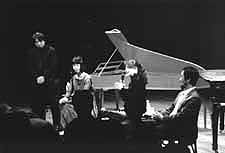|
On Tuning and Temperament
no. 1
|
by FUJIEDA Mamoru (composer)
|
In the Just Forum series, a variety of issues
concerning tunings and temperaments will be presented. In this
series of articles, the composer FUJIEDA Mamoru, who has organized
the series, looks back on the last two years of Just Forum events.
On March 8, the third installment in the series, "Fortepiano
and Traditional Tuning and Temperament" was held at Xebec.
 I began organizing
the Just Forum series at Xebec about two years ago. I was motivated
to do so because I wanted to introduce people to the theory and
use of tunings and temperaments and give them a chance to hear
the diversity of tunings and temperaments that exist as well as
investigate the directions that music might be headed in the future.
During my study of composition on the American West Coast, discovering
the music of Harry PARTCH and Lou HARRISON was of the greatest
value to me. Through the radical use they had made of tunings
and temperaments, I was led to re-examine my own composing, and
this in turn led to Just Forum, which was designed to consider
tuning- and temperament-related issues with a large number of
people in the context of Japan.
I began organizing
the Just Forum series at Xebec about two years ago. I was motivated
to do so because I wanted to introduce people to the theory and
use of tunings and temperaments and give them a chance to hear
the diversity of tunings and temperaments that exist as well as
investigate the directions that music might be headed in the future.
During my study of composition on the American West Coast, discovering
the music of Harry PARTCH and Lou HARRISON was of the greatest
value to me. Through the radical use they had made of tunings
and temperaments, I was led to re-examine my own composing, and
this in turn led to Just Forum, which was designed to consider
tuning- and temperament-related issues with a large number of
people in the context of Japan.
This year on March 8 the third installment
in the series was held. In the first installment, I used CDs
and videos to introduce the tuning- and temperament-related ideas
and practices of American experimental composers such as Partch
and Harrison. In this way, I wanted to show that despite the
large number of experimental composers using these methods, tunings
and temperaments have been used in all sorts of different ways.
For example, besides Partch and Harrison, there are composers
such as Terry RILEY and La Monte YOUNG, who give improvisational
performances with pianos in just intonation, and David HYKES who
leads the Harmonic Choir, for which he has created a choral method
using harmonic overtones. Glenn BRANCA and Arnold DREYBLATT,
like Partch, have created their own instruments, and through the
use of ensembles have tried to apply the power of harmonic overtones
to music through new tunings with just intonation. There are
also people like Larry POLANSKY, who by invoking the power of
computers is trying to pursue new directions in just intonation.
There are also John Luther ADAMS and Sasha MATSON, who make music
by focusing on Pythagorean temperament, Ben JOHNSTON and James
TENNEY, who have developed a unique theory of just intonation,
and so many other composers, whose names could be mentioned in
this context. As part of the heightened interest in tuning and
temperament in the U.S., there is a certain kind of pioneering
spirit to redefine the basic standards of sound and carve out
a new context that differs from Western modernism. Besides being
influenced by this attitude, what can we in Japan do? I began
to think of this as my personal mission. Not long after I encountered
the koto, the traditional Japanese instrument, and started experimenting
with new tunings and temperaments by using just intonation and
Pythagorean tuning together with some koto players. In doing
so, fresh kinds of sound began to emerge from the koto. To continue
on with these experiments, I formed Monophony Consort, an ensemble
that features the koto and continues to perform concerts with
the theme of tunings and temperaments. In the second Just Forum
event, the ensemble performed works by me, Partch, Harrison, and
Riley among others, and the audience was able to actually experience
the sound of new tunings and temperaments.
 Developing an awareness
about tuning and temperament has also had a great influence on
my own composing. In particular, in a series of composition called
"Patterns of Plants", I wrote this from the viewpoint
of a plant that was given to me by DOGANE Yuji, and combined my
interest in the computer programming language MAX and traditional
instruments like the koto and sho (mouth organ) to make use of
a variety of tunings and temperaments. My interest in tunings
and temperaments has also expanded to include the piano. In the
mid-19th century, when mass production of pianos with steel frames
(the same way they are made today) began, equal temperament was
also introduced. From that time on, the equally tempered piano
became an essential instrument in modern music. However, before
that time the most common type of piano was the fortepiano, which
had a wooden frame. At that point, many tunings and temperaments
co-existed, including meantone and well temperament. The third
part of the Just Forum series was concerned with the pre-modern
piano, and tunings and temperaments. The instrument-builder,
SATO Yuichi brought a fortepiano, and a Yamaha piano that belongs
to Xebec was retuned to the Werckmeister-style of well temperament.
A concert was performed by the fortepianist IWABUCHI Mieko and
the pianist SHIBANO Satsuki using these instruments. To many
people, whose ears are accustomed to the modern piano and equal
temperament, the sounds that arise from the fortepiano and the
Werckmeister seemed very fresh. In addition, the faint sounds
gave rise to new issues such as changes in our awareness, and
the sensual relation between mechanisms in the instruments and
the human body. In this way the Just Forum series and others
like it with a focus on tunings and temperaments provide a place
to experience concrete sounds concerning important issues that
many people have not given much attention to in the past. By
becoming familiar with a variety of tunings and temperaments,
a listener becomes more perceptive about a variety of sounds,
and this in turn can work as an impetus to pursue new directions
in a variety of musics. I'm looking forward to having another
chance to widen your ears again in the future with Just Forum.
Developing an awareness
about tuning and temperament has also had a great influence on
my own composing. In particular, in a series of composition called
"Patterns of Plants", I wrote this from the viewpoint
of a plant that was given to me by DOGANE Yuji, and combined my
interest in the computer programming language MAX and traditional
instruments like the koto and sho (mouth organ) to make use of
a variety of tunings and temperaments. My interest in tunings
and temperaments has also expanded to include the piano. In the
mid-19th century, when mass production of pianos with steel frames
(the same way they are made today) began, equal temperament was
also introduced. From that time on, the equally tempered piano
became an essential instrument in modern music. However, before
that time the most common type of piano was the fortepiano, which
had a wooden frame. At that point, many tunings and temperaments
co-existed, including meantone and well temperament. The third
part of the Just Forum series was concerned with the pre-modern
piano, and tunings and temperaments. The instrument-builder,
SATO Yuichi brought a fortepiano, and a Yamaha piano that belongs
to Xebec was retuned to the Werckmeister-style of well temperament.
A concert was performed by the fortepianist IWABUCHI Mieko and
the pianist SHIBANO Satsuki using these instruments. To many
people, whose ears are accustomed to the modern piano and equal
temperament, the sounds that arise from the fortepiano and the
Werckmeister seemed very fresh. In addition, the faint sounds
gave rise to new issues such as changes in our awareness, and
the sensual relation between mechanisms in the instruments and
the human body. In this way the Just Forum series and others
like it with a focus on tunings and temperaments provide a place
to experience concrete sounds concerning important issues that
many people have not given much attention to in the past. By
becoming familiar with a variety of tunings and temperaments,
a listener becomes more perceptive about a variety of sounds,
and this in turn can work as an impetus to pursue new directions
in a variety of musics. I'm looking forward to having another
chance to widen your ears again in the future with Just Forum.
Fujieda Mamoru (composer) can be reached via
email at KFD00016@niftyserve.or.jp
He completed a doctorate in music at the University
of California, San Diego. After being influenced by Harry Partch
and Lou Harrison during his stay in the U.S., Fujieda began pursuing
new types of tunings and temperaments based on just intonation.
As a result, he began a series of compositions called "Patterns
of Plants," and formed the ensemble Monophony Consort. In
April of this year, he will hold a collaborative exhibition with
the potter ITO Kosho at the Bunpodo Gallery, and again in November
with the artist SHIIHARA Tamotsu at Sagacho Exhibition Space.
A recording of "Patterns of Plants" has been released
on CD.
 I began organizing
the Just Forum series at Xebec about two years ago. I was motivated
to do so because I wanted to introduce people to the theory and
use of tunings and temperaments and give them a chance to hear
the diversity of tunings and temperaments that exist as well as
investigate the directions that music might be headed in the future.
During my study of composition on the American West Coast, discovering
the music of Harry PARTCH and Lou HARRISON was of the greatest
value to me. Through the radical use they had made of tunings
and temperaments, I was led to re-examine my own composing, and
this in turn led to Just Forum, which was designed to consider
tuning- and temperament-related issues with a large number of
people in the context of Japan.
I began organizing
the Just Forum series at Xebec about two years ago. I was motivated
to do so because I wanted to introduce people to the theory and
use of tunings and temperaments and give them a chance to hear
the diversity of tunings and temperaments that exist as well as
investigate the directions that music might be headed in the future.
During my study of composition on the American West Coast, discovering
the music of Harry PARTCH and Lou HARRISON was of the greatest
value to me. Through the radical use they had made of tunings
and temperaments, I was led to re-examine my own composing, and
this in turn led to Just Forum, which was designed to consider
tuning- and temperament-related issues with a large number of
people in the context of Japan.